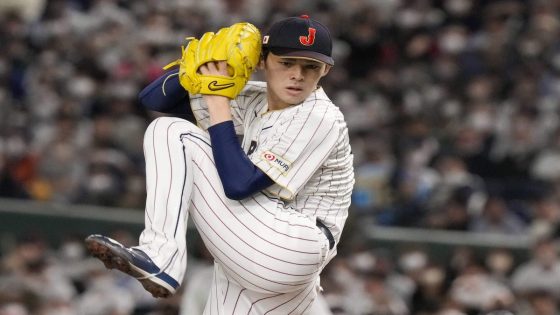NEW YORK — In the last year, as anticipation built that highly coveted Japanese pitcher Roki Sasaki could sign with a Major League Baseball team this offseason, front-office executives have continuously speculated behind closed doors that the outcome is predetermined. The officials suspect that Sasaki has some sort of unwritten agreement to join the Los Angeles Dodgers.
Executives have brought some of those rumors, at least informally, to the commissioner’s office, and Dodgers higher-ups have heard them as well, according to people briefed on the discourse who were not authorized to speak publicly.
Sasaki’s agent, Joel Wolfe of Wasserman, denied the allegation on Wednesday, hours after commissioner Rob Manfred also tried to quell the topic.
“While a bunch of executives who should know me better and do a lot of business with me insult my integrity by insinuating that I would be a part of some type of nefarious agreement,” Wolfe told The Athletic, “in reality, this is just poor sportsmanship.”
Responding to a question about the rumors at MLB headquarters, Manfred said he expects Sasaki will not sign until after the new year. That could in theory diminish the Dodgers’ chances of signing the pitcher.
Sasaki, 23, is soon to be an international amateur free agent under baseball’s rules, which means teams must bid on his services using their international bonus pool money. MLB rules forbid teams from reaching unwritten agreements with those players before they are eligible, and Sasaki’s Japanese team has yet to formally post him for bidding.
The Dodgers have $2.5 million left in their bonus pool for the 2024 signing period, which ends on Dec. 15. That’s more than any other team, and the fact they saved that much has further prompted finger-pointing that they expect to land Sasaki.
But Manfred said Sasaki likely will be signed only once the new international signing period opens on Jan. 15, making him part of the 2025 class. At that point, every team enters the signing period with a fresh allotment of money, making for a theoretically more even playing field.
The Dodgers, who declined comment, will be among the teams with the least available money to spend in the new period at $5.1 million. At the high end, some teams will have a little more than $7.5 million.
“In my media training, they told me never to answer questions that involve suspicions, so I could pass all together,” Manfred said when asked about the money the Dodgers had preserved in their 2024 pool. “Just one clarification. It kind of looks like the way it’s going to shake out, the signing there — just because of the timing — will happen in the new pool period. So that’s kind of a significant fact.
“But you know, we’re going to see what happens there. If there’s any reason to believe that there was a violation of one of our rules, you can rest assured that we will thoroughly investigate and try to get to the bottom of it.”
The Chiba Lotte Marines of Nippon Professional Baseball announced earlier this month they will post Sasaki for bidding, setting the stage for a fierce competition for his services. The World Series champion Dodgers have been linked to Sasaki in part because they already have two former NPB stars, Shohei Ohtani and Yoshinobu Yamamoto, on their roster.
Although unwritten agreements with international amateurs are banned, they happen all the time in Latin America, where most international amateur players hail from.
There are no known published reports of the Dodgers violating the sport’s rules in their pursuit of Sasaki. Speculation, however, has persisted. Dallas Keuchel, a former Cy Young Award winner who was Sasaki’s teammate on Chiba Lotte this year, told the New York Post earlier this month, “I heard some rumblings about a done deal with the Dodgers — you know, having a plan for him.”
Preventing teams from gaining unfair access to foreign players isn’t a new topic for the commissioner’s office. In March, the league banned “working agreements” between MLB clubs and four formally recognized foreign leagues: the top circuits in China, Korea, Japan and Mexico.
MLB teams were also newly forbidden from working directly with any employees or associates of teams in those leagues.
Before March, MLB had allowed working agreements, so long as they were submitted to the league office for approval. But the league went a step further in the spring after some teams complained about other teams’ arrangements, said one high-ranking club official who was not authorized to speak publicly.
“There are certain things — exchange of information, whatever — that (were) perfectly allowable,” Manfred said Wednesday. “The concern with those agreements comes when, for example, the American club has some priority access to players that are under control because it would allow them to expand the number of players they have under control. And we’ve always been scrupulous about not allowing those.”
(Top photo of Roki Sasaki: Associated Press / Eugene Hoshiko)





